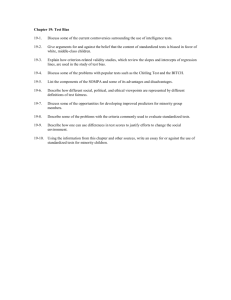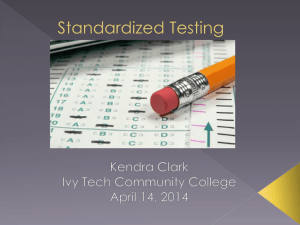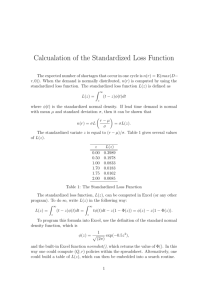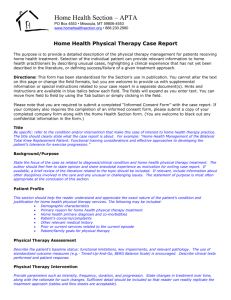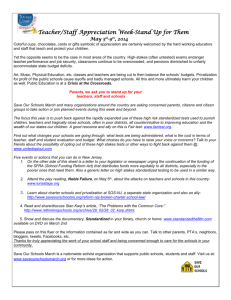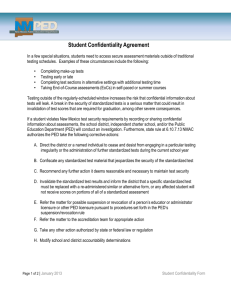Sample student research paper
advertisement
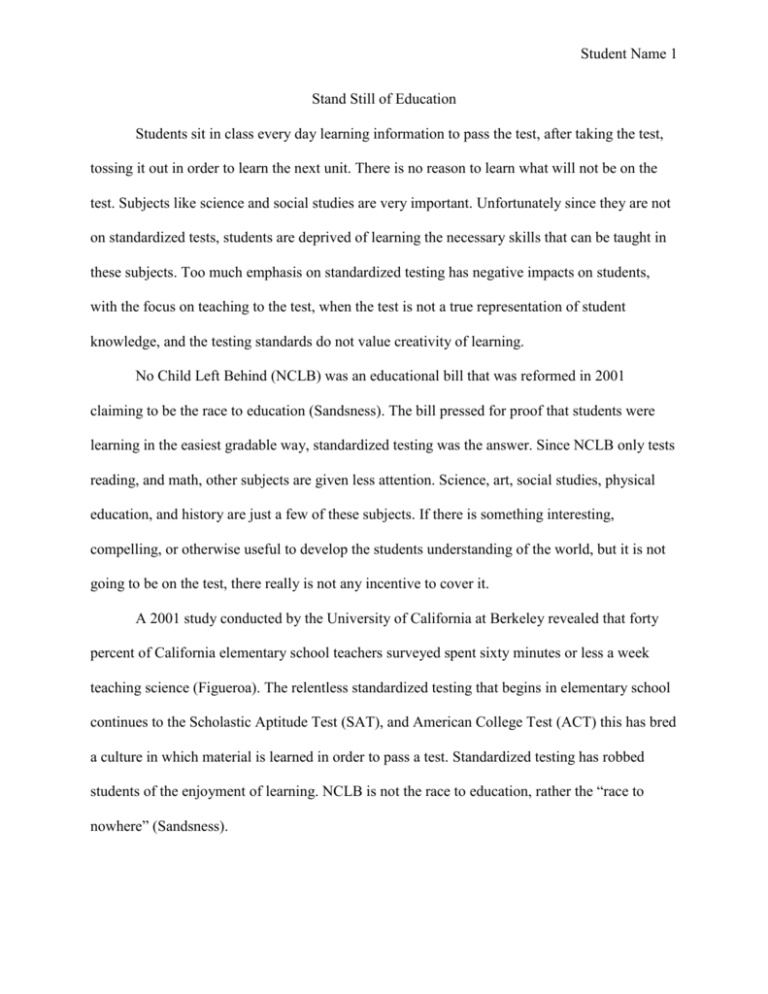
Student Name 1 Stand Still of Education Students sit in class every day learning information to pass the test, after taking the test, tossing it out in order to learn the next unit. There is no reason to learn what will not be on the test. Subjects like science and social studies are very important. Unfortunately since they are not on standardized tests, students are deprived of learning the necessary skills that can be taught in these subjects. Too much emphasis on standardized testing has negative impacts on students, with the focus on teaching to the test, when the test is not a true representation of student knowledge, and the testing standards do not value creativity of learning. No Child Left Behind (NCLB) was an educational bill that was reformed in 2001 claiming to be the race to education (Sandsness). The bill pressed for proof that students were learning in the easiest gradable way, standardized testing was the answer. Since NCLB only tests reading, and math, other subjects are given less attention. Science, art, social studies, physical education, and history are just a few of these subjects. If there is something interesting, compelling, or otherwise useful to develop the students understanding of the world, but it is not going to be on the test, there really is not any incentive to cover it. A 2001 study conducted by the University of California at Berkeley revealed that forty percent of California elementary school teachers surveyed spent sixty minutes or less a week teaching science (Figueroa). The relentless standardized testing that begins in elementary school continues to the Scholastic Aptitude Test (SAT), and American College Test (ACT) this has bred a culture in which material is learned in order to pass a test. Standardized testing has robbed students of the enjoyment of learning. NCLB is not the race to education, rather the “race to nowhere” (Sandsness). Student Name 2 Standardized tests occur in an artificial learning environment, they are timed, and students cannot talk, ask questions, use references, learning devices, or get up and move around. The similarity to prison conditions is striking. Yet, even the most hard-headed conservative will say that education must prepare the students for the “real world” (What's Wrong with Standardized Tests). How often does the real world look like this? Clearly standardized tests do not prepare for the real world. The test cannot be a true representation of student knowledge unless they are able to use everything needed to maximize the student’s potential. Standardized tests do not provide any feedback to the teachers or students (Mercogliano). The results are not given until months later and there are no instructions provided by the test companies on how to improve scores. If teachers are unsure of what they need to work harder towards while teaching the students, how can the students be expected to do better. Schools should be moving forward, each graduating class smarter than the last, improving every day, instead we are at a standstill. Standardize tests do not value creativity, a student who writes a more creative answer in the margin does not realize that a human will not ever see it. Machines grade these tests and any answer that does not follow the format is counted as wrong (Mercogliano). This student could have written a great answer that made since and brought up a point that could have never been taken into consideration, yet since it did not follow the format the answer was marked as wrong. Within creativity there is diversity, there is a wide range of differences in cultural backgrounds, levels of learning and thinking styles, family backgrounds, and life experience among the students who take standardize tests (What's Wrong with Standardized Tests?). Standardized tests treat students as if they were all identical to the group that took the test several years ago, and to which the test has been normed (Lieberman). Everyone is different and talented Student Name 3 at different things, it is irrational to jump to conclusions upon how smart an individual is due to the grade someone made on a standardized test. Too much emphasis on standardized testing has negative impacts on students, with the focus on teaching to the test, when the test is not a true representation of student knowledge, and the testing standards do not value creativity of learning. A student deserves more accreditation than a standardized test telling them that they are or are not good enough. School boards need to change the way they test their students. Standardize testing is not the way to better our future, we should be moving forward not in a stand still. Student Name 4 Works Cited Figueroa, Alyssa. "8 Things You Should Know About Corporations Like Pearson That Make Huge Profits from Standardized Tests." Alternet. N.p., Sept. 2013. Web. 20 Oct. 2014. Lieberman, Myron. Public Education. Cambridge: Harvard University press, 1993, Print. Mercogliano, Chris. 15 Reasons Why Standardized Tests Are Worthless. N.p., 14 Mar. 2014. Web. 21 Oct. 2014 Sandsness, Ryan. "Standardized Failures." Genetics Generation. N.p., 3 Apr. 2013. Web. 21 Oct. 2014. "What's Wrong With Standardized Tests?" Fair Test. National Center of Fair and Open Testing, 22 May 2012. Web. 27 Oct. 2014.
